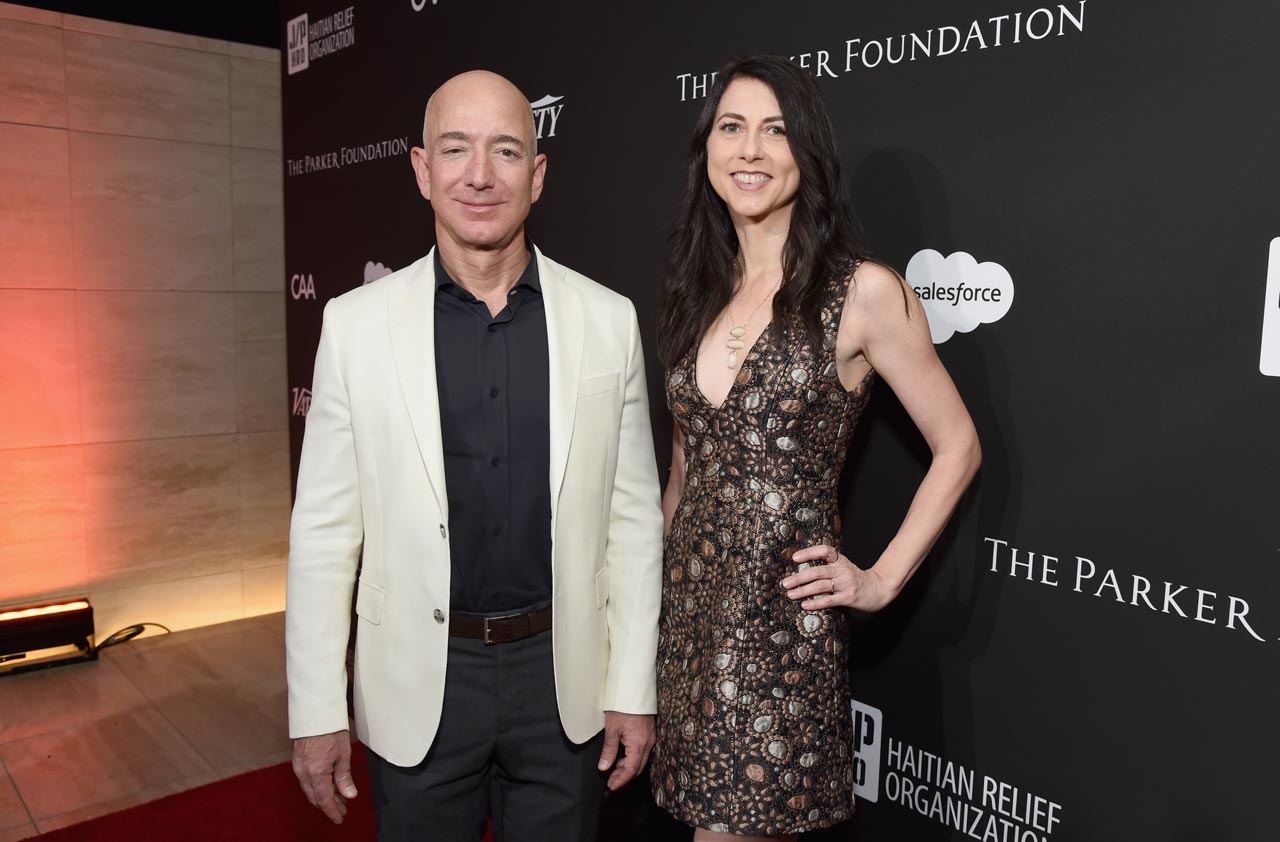McKenzie Bezos: 4 Wealth Strategy Concerns
$36 billion doesn't come without some challenges. There are four lingering money issues for McKenzie Bezos to take into consideration.


Profit and prosper with the best of Kiplinger's advice on investing, taxes, retirement, personal finance and much more. Delivered daily. Enter your email in the box and click Sign Me Up.
You are now subscribed
Your newsletter sign-up was successful
Want to add more newsletters?

Delivered daily
Kiplinger Today
Profit and prosper with the best of Kiplinger's advice on investing, taxes, retirement, personal finance and much more delivered daily. Smart money moves start here.

Sent five days a week
Kiplinger A Step Ahead
Get practical help to make better financial decisions in your everyday life, from spending to savings on top deals.

Delivered daily
Kiplinger Closing Bell
Get today's biggest financial and investing headlines delivered to your inbox every day the U.S. stock market is open.

Sent twice a week
Kiplinger Adviser Intel
Financial pros across the country share best practices and fresh tactics to preserve and grow your wealth.

Delivered weekly
Kiplinger Tax Tips
Trim your federal and state tax bills with practical tax-planning and tax-cutting strategies.

Sent twice a week
Kiplinger Retirement Tips
Your twice-a-week guide to planning and enjoying a financially secure and richly rewarding retirement

Sent bimonthly.
Kiplinger Adviser Angle
Insights for advisers, wealth managers and other financial professionals.

Sent twice a week
Kiplinger Investing Weekly
Your twice-a-week roundup of promising stocks, funds, companies and industries you should consider, ones you should avoid, and why.

Sent weekly for six weeks
Kiplinger Invest for Retirement
Your step-by-step six-part series on how to invest for retirement, from devising a successful strategy to exactly which investments to choose.
On April 4, it was announced that McKenzie Bezos would be receiving $36 billion worth of assets from her divorce from Jeff Bezos, founder of Amazon and the world’s wealthiest person.
First of all, congratulations to Jeff and McKenzie for keeping this divorce process short, out of the media as much as possible, and out of the courts. We are not going to know the details of the Bezos’ agreement. However, some information has been disclosed in the press.
As reported by CNN, McKenzie is keeping 4% of their Amazon stock, worth approximately $36 billion. Jeff retains voting power for her shares, as well as ownership of The Washington Post and Blue Origin, their space exploration venture. According to The Economist, this makes the Bezos divorce the most expensive in history by a long shot.
From just $107.88 $24.99 for Kiplinger Personal Finance
Become a smarter, better informed investor. Subscribe from just $107.88 $24.99, plus get up to 4 Special Issues

Sign up for Kiplinger’s Free Newsletters
Profit and prosper with the best of expert advice on investing, taxes, retirement, personal finance and more - straight to your e-mail.
Profit and prosper with the best of expert advice - straight to your e-mail.
As a post-divorce financial planner, I feel a little silly thinking of what I would tell McKenzie to do with her money now. The magnitude of her portfolio is well beyond run-of-the-mill, high-net-worth divorces with assets “only” in the millions or tens of millions of dollars. McKenzie can buy $100-million or $200-million houses and condos wherever she wants. She can have her own jets and her own yachts. She could buy an island or two.
McKenzie’s wealth, though, is concentrated in Amazon (AMZN) stock. That has worked out well for the Bezos’ for the past several years. It is likely to continue to be a great source of wealth for both of them in the future. As it stands, McKenzie is now the third-richest woman in the world. Who knows, if she holds onto AMZN stock, she could become the richest woman in the world one day! McKenzie’s concerns with budgeting, taxes, and wealth strategy will soon be in a class of their own.
There are, however, some lingering considerations for McKenzie, particularly when it comes to capital gains taxes, portfolio management, philanthropy, and wealth transfer.
Capital Gains Taxes
McKenzie probably has an enormous tax liability built into her AMZN holdings. While I am not privy to her cost basis, it is not unreasonable to assume that it is close to zero since the Bezos’ have owned Amazon stock since the company’s inception. Should McKenzie sell her AMZN stock, the entire amount would likely be subject to capital gains taxes. Because McKenzie is likely to be in the top tax bracket, she would pay 23.8% in federal capital-gains tax (the top 20% bracket plus the 3.8% ACA surcharge), plus state liability that would depend on where she lives at the time. As such, McKenzie may not be worth quite $36 billion after taxes are accounted for.
A benefit of keeping the stock until her death is that her estate will benefit from a step up in cost basis. This would mean that the IRS would consider the cost of the stock to be equal to its value at her death. This favorable tax treatment would wipe out her heirs’ capital gains tax liability.
Portfolio Management
Nevertheless, the standard advice that wealth strategists give clients with ordinary wealth applies to Ms. Bezos as well: It would be in McKenzie’s financial interest to diversify her holdings. Diversifying would help her reduce the risk of having her wealth concentrated into a single stock. It is a problem that McKenzie (and Jeff) share with many employees of technology and biotech startups.
McKenzie might not want to sell all of her AMZN stock or even most of it. Although we have not read their separation agreement, she has probably agreed with Jeff that she will retain the bulk of her holding. She may also believe enough in AMZN and Jeff’s leadership to sincerely want to keep it. Regardless, McKenzie should still diversify her portfolio to protect herself against AMZN-specific risks.
Philanthropy
An advantage of having more money than you need is that you have the option to use the excess to make a measurable impact on the world through philanthropy. In 2018, Jeff and McKenzie created a $2 billion fund, the Bezos Day One Fund, to help fight homelessness. Given that the home page of the fund now only features Jeff’s signature, this may mean that Jeff is keeping this also. McKenzie will likely organize her own charity. What will her cause be?
Philanthropy can be an effective tax and estate management tool, primarily because the IRS allows taxpayers who itemize to deduct your donations against your income. For McKenzie, it is about deciding what to do with the money, instead of letting Congress decide.
Wealth Transfer
McKenzie’s net worth is far in excess of the current protections from federal and state estate taxes. Unless she previously planned for it during her marriage, she will have to revise her estate plan. Even though her heirs would benefit from a step up in basis on her AMZN stock if she chooses not to diversify, the inheritance would still be subject to estate taxes, potentially in the billions of dollars.
Of course, no matter how much estate tax is due, it is likely that she will have plenty to leave to her heirs.
Financially, McKenzie Bezos has what wealth strategists would consider “good financial problems.” She has the financial freedom to focus on the important aspects of life: family, relationships and making a difference.
Profit and prosper with the best of Kiplinger's advice on investing, taxes, retirement, personal finance and much more. Delivered daily. Enter your email in the box and click Sign Me Up.

Chris Chen CFP® CDFA is the founder of Insight Financial Strategists LLC, a fee-only investment advisory firm in Newton, Mass. He specializes in retirement planning and divorce financial planning for professionals and business owners. Chris is a member of the National Association of Personal Financial Advisors (NAPFA). He is on the Board of Directors of the Massachusetts Council on Family Mediation.
-
 Nasdaq Leads a Rocky Risk-On Rally: Stock Market Today
Nasdaq Leads a Rocky Risk-On Rally: Stock Market TodayAnother worrying bout of late-session weakness couldn't take down the main equity indexes on Wednesday.
-
 Quiz: Do You Know How to Avoid the "Medigap Trap?"
Quiz: Do You Know How to Avoid the "Medigap Trap?"Quiz Test your basic knowledge of the "Medigap Trap" in our quick quiz.
-
 5 Top Tax-Efficient Mutual Funds for Smarter Investing
5 Top Tax-Efficient Mutual Funds for Smarter InvestingMutual funds are many things, but "tax-friendly" usually isn't one of them. These are the exceptions.
-
 One of the Most Powerful Wealth-Building Moves a Woman Can Make: A Midcareer Pivot
One of the Most Powerful Wealth-Building Moves a Woman Can Make: A Midcareer PivotIf it feels like you can't sustain what you're doing for the next 20 years, it's time for an honest look at what's draining you and what energizes you.
-
 I'm a Wealth Adviser Obsessed With Mahjong: Here Are 8 Ways It Can Teach Us How to Manage Our Money
I'm a Wealth Adviser Obsessed With Mahjong: Here Are 8 Ways It Can Teach Us How to Manage Our MoneyThis increasingly popular Chinese game can teach us not only how to help manage our money but also how important it is to connect with other people.
-
 Looking for a Financial Book That Won't Put Your Young Adult to Sleep? This One Makes 'Cents'
Looking for a Financial Book That Won't Put Your Young Adult to Sleep? This One Makes 'Cents'"Wealth Your Way" by Cosmo DeStefano offers a highly accessible guide for young adults and their parents on building wealth through simple, consistent habits.
-
 To Love, Honor and Make Financial Decisions as Equal Partners
To Love, Honor and Make Financial Decisions as Equal PartnersEnsuring both partners are engaged in financial decisions isn't just about fairness — it's a risk-management strategy that protects against costly crises.
-
 For More Flexible Giving, Consider Combining a Charitable Remainder Trust With a Donor-Advised Fund
For More Flexible Giving, Consider Combining a Charitable Remainder Trust With a Donor-Advised FundIf a charitable remainder trust puts too many constraints on your family's charitable giving, consider combining it with a donor-advised fund for more control.
-
 These Thoughtful Retirement Planning Steps Help Protect the Life You Want in Retirement
These Thoughtful Retirement Planning Steps Help Protect the Life You Want in RetirementThis kind of planning focuses on the intentional design of your estate, philanthropy and long-term care protection.
-
 A Wake-Up Call and a Healthy Dose of Terror: How to Survive Your First Days in Prison
A Wake-Up Call and a Healthy Dose of Terror: How to Survive Your First Days in PrisonThis young man needed to be scared straight after his mother expressed her fear that he was on a path to prison. Hearing these eight do's and don'ts worked.
-
 How Money Guilt Holds Women Back (and How You Can Send It Packing)
How Money Guilt Holds Women Back (and How You Can Send It Packing)Women shouldn't let guilt limit the way they manage their hard-earned wealth. It's time to separate emotion from financial decision-making.